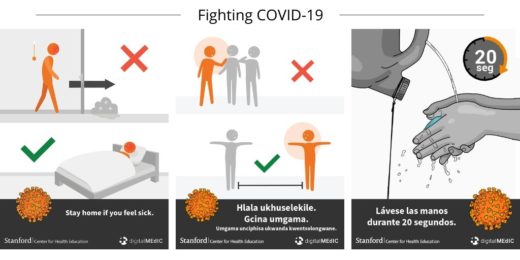Paul Costello has hosted scores of 1:2:1 podcast interviews with well-known authors, physicians, leaders and others. Here, he picks a few favorites.
Popular
In the Spotlight: Identifying hidden hurdles for mothers in medicine
This "In the Spotlight" features Jessica Gold, a pediatric hospitalist who lobbied to remove an obstacle to career advancement for physicians who are mothers.
Improving cancer prognoses: A radio show
A Stanford oncologist discusses how to improve cancer diagnosis and treatment, including using predictive modeling, liquid biopsies and immunotherapy.
Match Day: Stanford medical students celebrate their accomplishments amid pandemic
During the COVID-19 pandemic, Stanford medical students learn where they "matched" for residency in a virtual Match Day.
Our medical education is on hold, but we’re still finding ways to help
The coronavirus pandemic interrupted medical education for students around the U.S., but they continue to contribute, writes Stanford student Orly Farber.
Keeping under-resourced communities informed about COVID-19
The Stanford Center for Health Education is creating digital COVID-19 informational materials for under-resourced communities around the world.
Investigating COVID-19’s impact on LGBTQ+ health
More data on LGBTQ+ health is key — not only for understanding the effects of COVID-19, but also to improve overall health, says a Stanford researcher.
How telehealth has exploded during the pandemic and why it is here to stay
In Stanford Medicine's Recover, Restore and Re-open framework, experts discuss how the shift to telehealth likely represents the new norm.
Capturing how our choices shape epidemics (and the COVID-19 pandemic)
Years before COVID-19, researchers started to develop a mathematical model to better represent how behavioral changes can affect the course of an epidemic.
Pain relief device uses real-world evidence to gain clearance, expanding options for kids
Tracking a pain-relief device's success in patients who aren't in clinical trials is seen as a promising approach to expanding treatment options for kids.
Preventing kids’ head injuries: Tips from a concussion expert
After a lull early in the pandemic, head injury rates for kids are ticking up again. Parents should know what to do if their child gets hurt.
Protecting your health (and sanity) during wildfire season
A Stanford Medicine researcher provides insight into how to protect yourself and your home during wildfire season.
Climate change impact may affect kids more severely
Researchers discuss the impact of climate change on children and suggest its impact on their health might be more severe, compared to adults.














